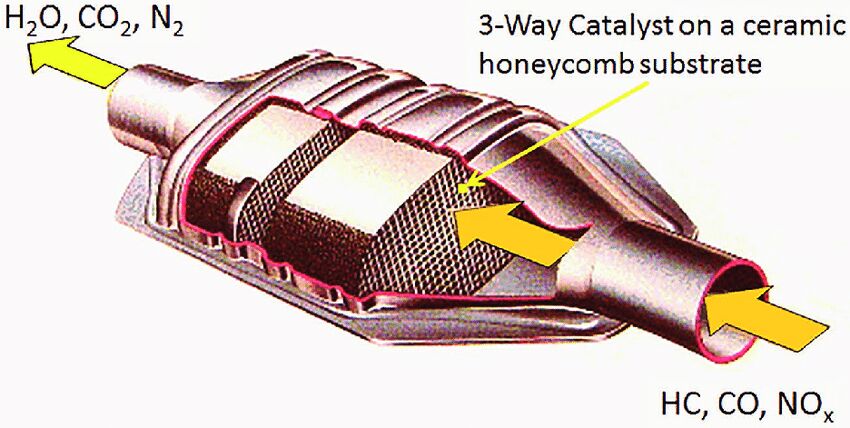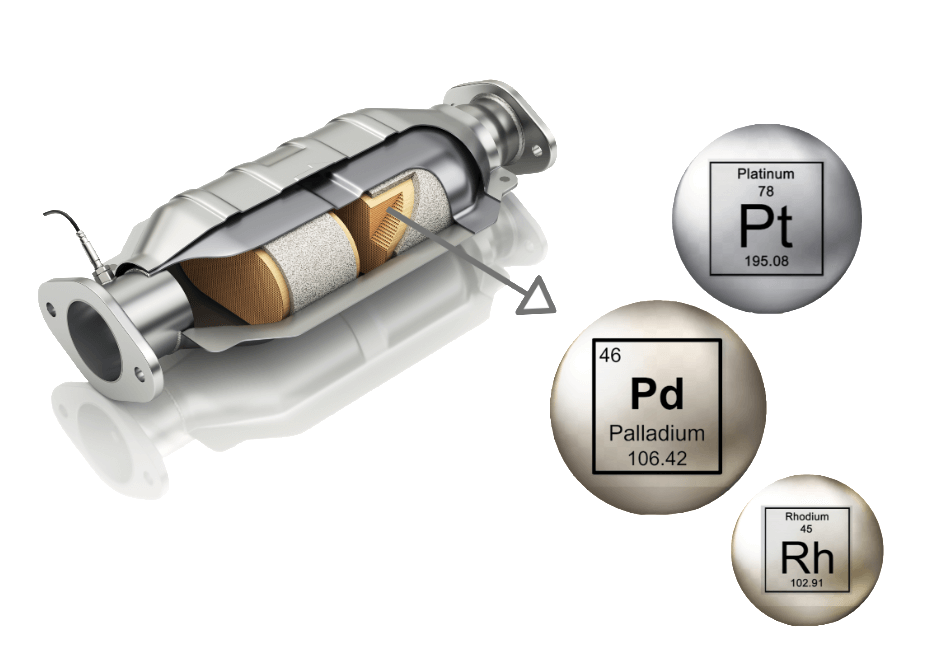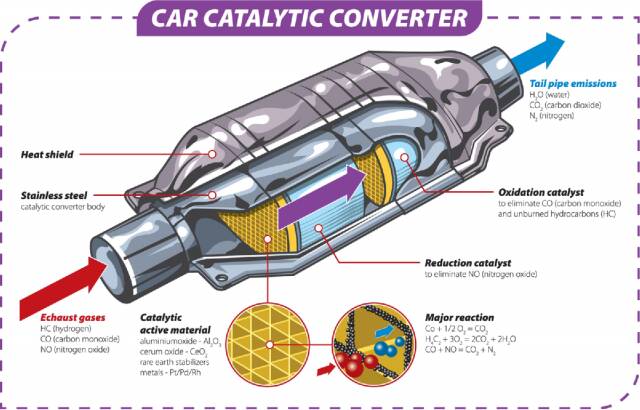Catalytic converters are small, easy to steal, easy to access, and highly valuable. There is a large market built around the theft and recycling of catalytic converters. Maybe that is why theft cases went up by 325% in the states in 2020 as National Insurance Crime Bureau (NICB) suggests.
Many videos of real cases verify that two professional thieves can steal a catalytic converter from a car in under 2 minutes. This is alarming due to the fact that CATs are among the most valuable parts of a car and can cost up to $5K. So, why are catalytic converter theft cases rising? Why do people steal it and how to prevent it? Let’s find out.
Table of Contents
What are Catalytic Converters?
Catalytic converters are exhaust cleaning devices that use precious metals as catalysts to react with and clean emission gases such as Carbon Monoxide, Nitrogen Oxide, and other hydrocarbons.
The by-products of the reaction of precious metals and harmful emissions are water vapor and carbon dioxide.
The device represents a hot water bag made of steel with a tube on both sides. On the interior, it flaunts a honeycomb model that has precious metals. Rhodium, Palladium, and Platinum are the most common catalysts used in CATs.
The gases in the exhaust pipes react with these elements and break them down into environment-friendly compounds. Catalytic converters are compact and precious devices. They are prone to theft and have a high resale value as well.
Do All Cars Have Catalytic Converters?
Fuel Injected engines produce a lot of harmful gases in their combustion chambers. Thus, catalytic converters help to clean up and react with these gases. Catalytic converters regulate according to the Clean Air Act and all FI engines must have one CAT.
All diesel and gasoline engines must have a catalytic converter to break down harmful emissions. Thus, all cars with diesel and gasoline engines have catalytic converters.
However, catalytic converters are not found in electric vehicles. They do not undergo any emissions and do not need a CAT. So, we can conclude that not all cars have catalytic converters. They are only a necessity in cars with combustion engines.
How Many Catalytic Converters are in a car?
Catalytic converters come at a hefty price and are one of the reasons why cars are so expensive. They are made up of precious metals and detoxify the harmful emissions from a vehicle’s exhaust. Thus, the number of catalytic converters in a car depends on the vehicle’s exhaust system.

Most cars have a single exhaust so they have only one catalytic converter. However, there are vehicles with dual exhaust which require two CATs. Even though catalytic converters are prone to theft, they are really durable and can even outlast the lifetime of a car.
Prices for Scrap Catalytic Converters
Catalytic converters are so expensive that many people will end up looking for used and scrap catalytic converters. In addition, the recent rise in thefts of CATs has also increased the demand for scrap products. So, what are the prices for scrap catalytic converters?
You can find scrap catalytic converters on eBay or in your local workshops in the price range of $300 to $1600. The deciding factor here on the price is the model of your car and the working condition of the catalytic converter on sale.
Catalytic converters, even in their useless form, can still hold intrinsic value for their high demand in the commodity market. Thus, the prices for scraps will likely never drop below $300.
Catalytic Converter Theft : Why Do People Steal Catalytic Converters?
Catalytic converters are easily the most stolen parts of automobiles. They are madly expensive and the worst part is that it can take up to three months to get a replacement for your stolen catalytic converter.
A regular thief can sell stolen catalytic converters for about $50 to $200 each. This figure is only 10% of the total loss the car owner has to bear.
The replacement price for CATs can easily reach from $1k to 3k. So, why do people steal catalytic converters?
-
Easily Accessible
CATs are placed at the bottom of vehicles near the exhaust system. The device is soldered to the frame and can be easily cut off from the joint.
For experienced thieves, it is a matter of a few minutes to get a hold of an item that is more than $1000 in value.
Even though theft cases are so common, manufacturers continue to ignore the vulnerabilities of the catalytic converters. Many people claim that manufacturers are intentionally letting the thefts continue as it has a huge recycling market.
Since these high-value devices can be easily accessed and stolen, many people tend to steal catalytic converters.
-
High Demand in Market
There is always a shortage of catalytic converters. The worst thing about having your catalytic converter stolen is that it can take up to 90 days to get a replacement on top of costing you more than $1500.
It can be a major nuisance for job holders who have to make daily commutes. Thus, there is a high demand for catalytic converters in the scrap market.

Unlike other stolen items that are hard to sell, catalytic converters can be easily sold in most locations since the buyer will receive a hefty profit. They can purchase an illegal catalytic converter for about $300 and sell it for $1500. Thus, many people steal catalytic converters.
-
Precious Metals
Another reason behind Catalytic converters’ theft is that the components that make catalytic converters expensive are the precious metals. They are the catalysts that execute the purifying chemical reactions with harmful emissions. These precious metals have a high value and demand in the commodity market.
The extraction process of precious metals from the honeycomb of catalytic converters can be completed without realizing a financial loss. Thus, many people steal catalytic converters for the intrinsic value of precious metals.
Catalytic Converter Theft: Prevention
Since CAT thefts are so common, let’s discuss how you can prevent them.
The most effective way to secure your catalytic converter is to use an anti-theft device. Recently many companies have started manufacturing anti-theft devices for catalytic converters.
It usually consists of a metal screen with screws that do not give thieves direct access to the catalytic converters.
If for reasons you cannot get your hands on the anti-theft device, always make sure to park your vehicle in a closed or guarded garage. A well-lit and properly monitored space is also preferred. The anti-theft devices also come with trackers in case the CATs get stolen.
